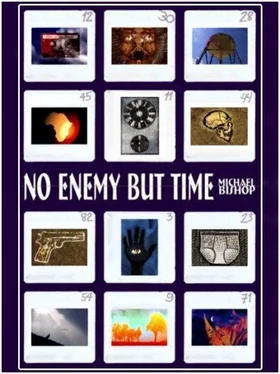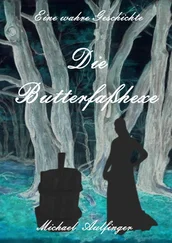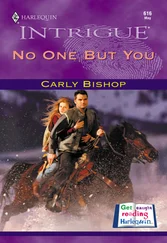Carrying her son, she crossed the final bridge before the jungle of minor industries flanking the highway on the south. Traffic was light but daunting, most demoralizingly so when the gigantic automobiles of American military personnel came whooshing by. Off to Encarnación’s right, the spooky amber of the Cruz del Campo sign gleamed above the dark superstructure of the brewery. No one stopped to offer her and her child a ride, and she did not attempt to solicit one. She was prepared to walk the entire distance.
To rest her arms, however, she soon set the boy down. Delighted, he trotted out ahead of her. Even barefoot, he looked quite handsome, for Encarnación had dressed him in a striped jersey and a pair of navy-blue shorts. She hurried to catch up with him, took his hand in hers, and counted his tiny steps in order not to have to think about the implications of what she was doing. Shortly—all too soon—the American enclave emerged from the oppressive dark.
Santa Clara reposed in the arid Andalusian countryside like an oasis of elms, neat stucco houses, and towering shepherd’s-crook street lamps. At the housing area’s unguarded entrance, these lamps cast overlapping circles of green-white radiance, blotting out the color of the lawns and imparting an oily sheen to the asphalt streets. Insects whirred in the grass, and music issued from an open doorway somewhere along the nearer of two parallel drives. In defiance of the panic building in her, Encarnación picked up her son and headed straight into this displaced American suburb. She had no clear idea what she was going to do, but she felt confident that her instincts were right. She knew a little about Americans.
Chance intervened.
A gaggle of teenage girls approached Encarnación along the drive, gossiping and gesticulating as they came. They had on toreador pants, or tight-fitting shorts, clothes that few Spanish girls would ever wear.
Despite the heat, the tallest of the five girls sported a crimson jacket with leather circlets around its shoulders and a huge felt hieroglyph on its left breast. Encarnación halted, weighing her options and hoping to calm the beating of her heart.
“Hey, look!” one of the girls exclaimed. “What’re they doing here?”
“Somebody’s maid, I’ll bet, looking for a ride home.”
“What about the kid?”
In a moment Encarnación was surrounded by these teenagers, even the shortest of whom dwarfed her.
They had apparently taken her child for either her little brother or a babysitting charge, and he charmed them by reaching out toward them with grimy fingers. Their banter was jolly, Encarnación decided, and she was especially reassured by the manner of the freckle-faced Amazon in the garish letter jacket. The letter jacket itself reassured her, ugly as it was.
“Hey, he’s cute. Really cute. He looks a lot like Lucky James Bledsoe.”
“Yeah, he really does.”
Then all the girls laughed, and the one in the letter jacket asked Encarnación, in tremulous Spanish, if she could hold the little boy. “ Con su permiso, por favor.” Encarnación yielded her son to this request, and he immediately clutched his new protectress’s red-gold hair and twisted it experimentally in his fingers.
“Ouch,” the Amazon cried, pulling her head back and laughing.
Whereupon another girl attempted to snatch the boy away from her. A mock battle for the right to hold him ensued, and he was swung from side to side as the girl in the letter jacket sought to retain custody.
Encarnación, deadening her instincts, began to back away. When she reached the edge of the circle of light cast by the street lamp, she turned around and ran, darting between a pair of single-story duplexes and disappearing into the shadows. Only then did the girls realize what she had done, and only then did her son break his self-imposed silence and screech in outraged bafflement. “Hey, you can’t do that!” shouted the Amazon after his fleeing mother. “ Vuélvase —come back! Come back here!”
The intruder was gone, vanished into blackness.
“Looks like you’ve inherited a little brother, Pam.”
The girls huddled together in the tree-lined drive. Raucous in the heavy stillness of the evening, the lyrics of a popular song reverberated from a nearby house:
“I’m with the crowd,
I’m with the party crowd—
Cool and cocky and keen.
Music’s growlin’ hot and loud.
Yeah, we’re proud
It’s a crazy scene…”
“Gee, what am I supposed to do now?” Shifting the screeching child to her other arm, the girl searched her friends’ shocked faces for an answer.
* * *
On the roof of the condemned building across from Leoncillos Street, Encarnación knelt beside the iron railing and brought great gouts of air up from her lungs. These she expelled painfully through her mouth and nostrils, her head hanging forward. The sound thus made was a resonant, unsteady keening, and she kept this up until her strength was gone and dawn began to glimmer in the east.
Helen
Isaw my first hominids—if not habilines—only a few minutes after I entered a strip of forest wedging into the savannah from the eastern hills. These creatures were the kind that in a dream diary of my youth I had always indicated by the symbol of a human hand with a set of blunt teeth in the palm. Australopithecus robustus in the argot of taxonomists, although I had not learned the impressive ten-dollar Latin words until I was eleven or twelve and had given up my diary in favor of tape cassettes.
“Johnny,” Jeannette had told me, handing me the portable recording unit my father had bought for me in Guam, “keep your diary with this. Use it to record your dreams. Recording them will be easier than writing them down. When you’re older, Johnny, you’ll have your ‘spirit-traveling episodes’ on tape.”
I had taken my mother’s advice.
Now—fifteen years later, or two million years earlier—I found myself watching several representatives of A. robustus (black-hands-with-teeth) in an East African thicket, and the invaluable lessons of my boyhood whirred through my head like the garbled output of a tape on high-speed reverse.
Heavily built creatures with wide faces and massive jaws, the australopithecines had been grubbing for insects and foraging desiccated fruit. There were five altogether, four of whom, apparently hearing me approach, beat a swift retreat into denser foliage. The remaining hominid was a male, his penis a mere nub in the Brillo pad of his pubic hair, his scrotum as round and intricately puckered as a rotten grapefruit. A pronounced crest ran fore and aft over his skull, like the wedge of a Mohawk haircut.
Fascinated, I decided to reveal my presence.
Despite my six-inch height advantage—he was probably about four feet, nine inches tall—for nearly a minute the male stood his ground, aggrievedly eying me and making rumbling noises in his throat and chest. He was covering the escape of the others, who had already completely disappeared. Then, having accomplished his purpose and satisfied the demands of honor, he too turned and gimped away into the undergrowth.
My heart was hiccupping in my chest. On my first day in the Pleistocene I had encountered specimens of an extinct hominid family—not extinct, however, but alive. Alive! Indeed, I was the first human being ever to lay eyes on an upright-walking primate that was not itself a human being, for the australopithecines have been extinct throughout the entire history of Homo sapiens . The significance of our brief encounter was staggering, and for a moment after the male’s departure I was at a loss to comprehend the full meaning—the unbelievable wonderfulness —of what had already befallen me. Indeed, Blair would have agreed to stand before a firing squad for a face-to-face confrontation with a burly member of A. robustus . I stared into the undergrowth after my unsociable hominid acquaintance.
Читать дальше



![Ally Carter - [Gallagher Girls 01] I'd Tell You I Love You But Then I'd Have to Kill You](/books/262179/ally-carter-gallagher-girls-01-i-d-tell-you-i-lo-thumb.webp)








